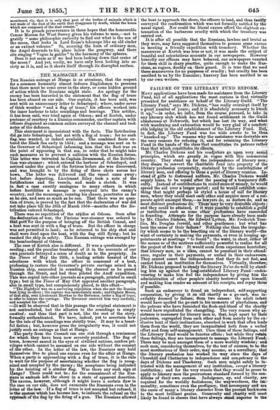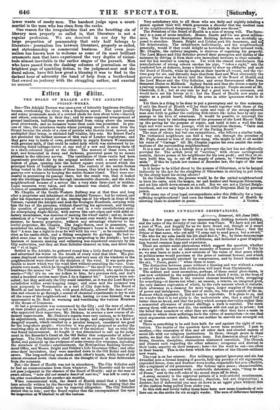FAILURE OF THE LITERARY FUND REFORM. Mawr applications have been
made for assistance from the Literary Fund, but of all applications the moat curious is that virtually presented for assistance on behalf of the Literary Guild.' "The Literary Fund," says Mr. Dickens, "has really overslept itself by a great number of years; and it is absolutely necessary to knock it up,"—in order, we infer, from the course pursued, to take iu any literary club which has not found settlement in the Guild almshouses at Nebworth, but which has lost its way, and what with wandering and exhaustion would be very glad of a comfort- able lodging in the old establishment of the Literary Fund. But; in fact, the Literary Fund was too wide awake to be thin': " knocked-up." The reasons why the assistance was desirable are the very reasons for refusing it, and for retaining the Literary Fund in the hands of the class that constitutes its patrons rather than that which constitutes its clients.
Mr. Charles Dickens and his coadjutors go upon very sound principles, which are greatly in_ vogna_with this commercial country. They stand up for the independence of literary men; they desire to convert the charitable fund into ,property of the literary profession corporately, sustained by the contributions of literary men, and offering to them a point of literary reunion. In- stead of gifts to distressed authors, Mr. Charles -Dickens woad supply loans, to be repaid after the passing'of temporary dill-- celty. Instead of contributions in round sums of money, he would spread the aid over a longer period ; and he would establish some- thing that might perhaps be styled a house of call for literary men, where they could meet each other and acquire more of a cor- porate spirit amongst them,—as lawyers do, as doctors do, and as most distinct professions do. These may be very desirable objects ; and they could be attained, if it were possible to establish a guild or institution such as some other professions have succeeded in founding.' Attempts for the purpose have already been made by Mr. Charles Dickens, Sir Edward Lytton, Mr. Frederick Tow- line, Mr. Douglas Jerrold, and other gentlemen : but what has been the cause of their failure? Nothing else than the irregular- ity which seems to be the besetting sin of the literary world—the want of certainty in making the payments, or even in keeping ap- pointments at meetings " to found"; the want, in short, either of the means or of the motives sufficientlypowerful to realize for all the project of the few. It would seem from experience heretofore; that literary men, as a class, cannot be punctual in their attend= ante, regular in their payments, or united in their endeavours. They cannot assert the independence that they do not feel, andt cannot found an institution for themselves. Virtually, therefore; Mr. Dickens proposed to steady the literary Ne'er-do-well by stand ing him up against the long-established Literary.Fund--endeit- venting to make him feel the independence by giving him the administration of other people's charity bestowed upon himself; and making him render an account of his receipts, and repay them if possible. Such an endeavour to found an independent, self-supporting corporation, by giving it an old oharity as a go-cart, was in- evitably doomed to failure; from two causes : the adult infant would have spoiled the go-cart in his moments of playfulness, and the patrons who have furnished the flesh-and-blood of the charity' would have repudiated the changelinF. The very reason why as- sistance is necessary for literary men is, that, kept apart by their jealousies, segregated from each other and from society by the ex- clusive bent of their inclinations, absorbed in work that often leads' them from 'the world, they are incapacitated both from a united effort and from self-management. Care them of these failings, and- the Literary Fund would be funetus officio; but while they retain these failings, they are incompetent to manage the Literary Fund: , There may be men amongst them of a more worldly wisdom.; and such men, considering themselves, by the test of enemas, to be the most meritorious of their order, may assume, as a oorrollary, that the literary profession has worked its way since the days of Churchill and Chatterton to independence and competency in the days of Dickens and Thackeray. Such men might safely be in- trusted with the management of any institution, except a literary- institution • and for the very reason that they would be prone to. apply to literary men the procrustean standard formed by the con- ditions of their own success. Indulgence, ay, and charity, are required for the worldly foolishness, the waywardness, the int- morality, sometimes even the profligacy, that accompany and- are the curse of many a literary character from the poorest bookworm to the most brilliant genius. Generosity and charity will most likely be found in classes that have always stood superior to the
lower wants of needy men. The harshest judge upon a court- martial is the man who has risen from the ranks.
One reason for the irregularities that are the besetting sin of literary men properly so called is, that literature is not a regular profession. We are deceived in our day by the large proportion of penmanship that only half belongs to literature : journalism lies between literature, properly so called, and statesmanship or commercial business. But even jour- nalism has known how to welcome as some of its most brilliant ornaments men that have experienced the very depths of vicissi- tude almost inevitable in the earlier stages of the pursuit. Men who have passed from the dashing columns of journalism or the brightest page of sparkling fiction, to the judgment-seat and the ducal saloon, have felt how great a blessing it was to find in the darkest hour of adversity the hand of help from a brotherhood that owned no jealousy with the struggling author, and exacted no account.



































 Previous page
Previous page